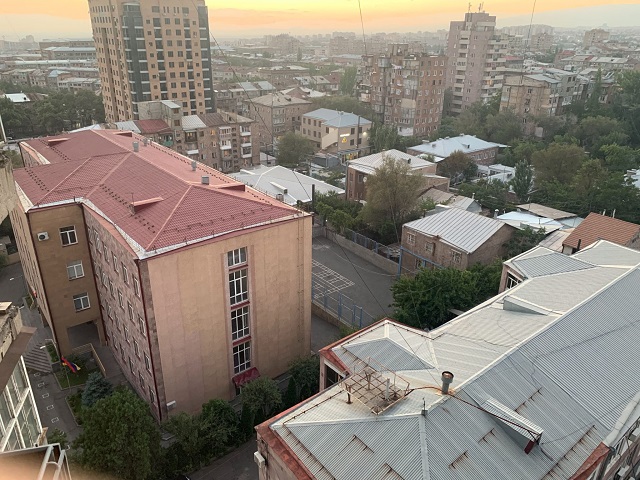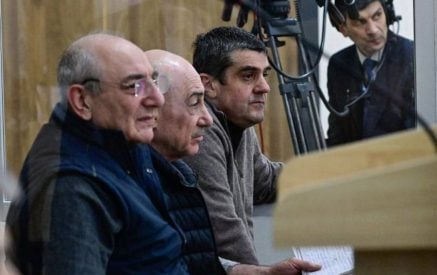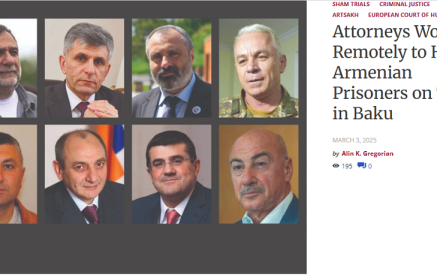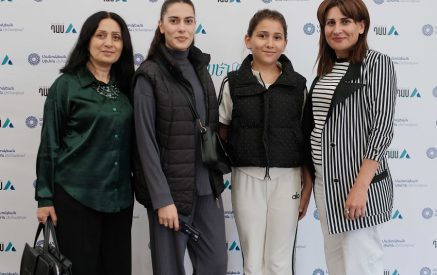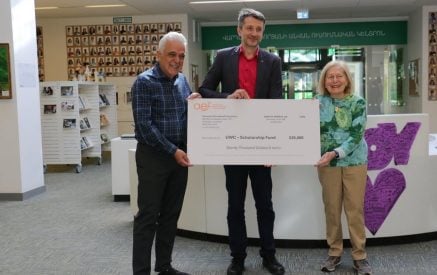The Armenian Weekly. Schools and universities across Armenia are preparing to receive their students next week, as the scholastic year is set to start on September 15. All educational institutions were abruptly shut down in March as the novel coronavirus first began to spread in the Caucasus republic. Classes were moved online as the Ministry of Education coordinated remote learning for the rest of the semester. Kindergartens were permitted to reopen in late May when the risk of transmission from children was deemed lower.
The new realities of distance education, however, unveiled significant challenges and infrastructural shortcomings as older, less tech-savvy educators and students from more vulnerable families struggled to cope with technological limitations. Uncertainty over the university application exams remained a particular point of contention for high school graduates throughout the summer, but Education Minister Arayik Harutyunyan did promise a simplified examination process under strict compliance with pandemic protocols to ensure that students would not miss out on higher education.
In the week running up to the reopening of schools, testing has ramped up among students and faculty. Explaining the spike in testing this week—reaching 3,518 for a 24-hour period—Health Ministry Spokeswoman Alina Nikoghosyan said, “The increase of the number of tests is due to the fact that teachers are being tested. They must be tested before the schools are reopened.” Students and staff are also being advised to self-quarantine before school. “In order to avoid new restrictions, please limit interactions of students and schoolchildren between September 1-14,” Minister Harutyunyan posted on his Facebook page.
According to the latest guidelines for safely reopening educational institutions issued by the Ministry of Education, classes will be divided into two smaller groups in socially-distanced classrooms, while students rotate between the first and second halves of the day. To make up for the shorter school days, classes will also take place on Saturdays. Courses which can be taught remotely, will. Masks are also mandatory in class. According to the Education Minister, this would make the potential for sporadic outbreaks much more manageable and would require only those students directly exposed to be quarantined, reserving school shutdowns for more extreme cases.
Read also
The decision to reopen schools has been made in consideration of the vastly improved epidemiological situation in the country in recent months. That hasn’t stopped some people from protesting both in favor and against the reopening of schools. Certain epidemiologists and health experts initially also raised concerns that many educational institutions did not have the sanitary equipment to fulfill their healthcode guidelines, but the Ministry says they have taken these concerns into account.
Since the first case of COVID-19 was confirmed on March 1, a strict three-week lockdown managed to slow the spread of the virus enough for the medical system to keep up, but the number of new cases began to grow exponentially in the wake of the rollback of restrictions on most freedom of movement and commerce on May 4. Peaking in late June and early July at an average rate of 500 new cases per day, the daily new case rate has experienced a steady and rapid decline over the summer following the introduction of mandatory masks and stricter enforcement of social-distancing protocols.
While Armenia has registered a total of 45,152 confirmed cases of COVID-19 since March, the number of active cases has dropped considerably as the number of new recoveries greatly outpaces the rate of new infections. As of September, less than 3,000 people are recovering from the virus, while some 41-thousand have already made full recoveries. At least 905 mostly-elderly people with preexisting health conditions have died as a result of contracting the virus. Health Minister Arsen Torosyan has cited projections showing the rate of new infections remaining at between 100 and 150 per day until a vaccine becomes widely available given the continued contact and movement between people despite widespread respect of social distancing rules.
The government has also passed new legislation enabling authorities to temporarily keep enforcing the use of masks and anti-epidemic measures in order to avoid extending the State of Emergency (SOE) situation again. The SOE, which has been maintained since March 16—albeit with the majority of constitutional restrictions being lifted—is set to expire on September 12. Foreign passport holders have been permitted to enter the country and avoid the mandatory 14-day quarantine upon the submission of negative test results. Several airlines have already resumed flights to Zvartnots International Airport and still more have announced new scheduled connections, including Belavia, Ural airline, Fly Dubai, Air France, Qatar Airways, MEA and Ryanair.



















































